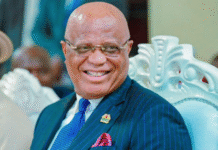The Chief Justice of Nigeria (CJN), Justice Ibrahim Muhammad, has summoned the chief judges of Rivers, Kebbi, Cross River, Anambra, Jigawa and Imo states high courts over questionable ex parte orders on the same subject matter emanating from courts within their judicial divisions.
It was gathered that the meeting between the CJN and the heads of courts is prelude to a larger one by the National Judicial Council (CJN).
While the High Courts in Imo, Jigawa and Anambra states would explain their roles in the Anambra governorship election, the ones in Rivers, Kebbi and Cross River states on the other hand would take their time to explain their involvement in the case of the chairman of the Peoples Democratic Party (PDP), Mr. Uche Secondus.
Recall that contradictory court orders were issued in respect of the choice of the governorship candidate of the All Progressives Grand Alliance (APGA) for the forthcoming election in Anambra State.
Similarly, in one week, three courts in different states also issued counter-orders about the office of the national chairman of the Peoples Democratic Party (PDP).
On August 24, a Rivers State High Court in Port Harcourt restrained Uche Secondus from parading himself as PDP national chairman.
However, in another twist, the Kebbi State High Court in Birnin-Kebbi restored Mr Secondus’ mandate as the national chairman of the opposition PDP on August 27.
A day after, Secondus’ reinstatement, another High Court in Calabar, Cross River State, issued an interim order restraining him from resuming office as PDP chairman.
It was gathered that the CJN felt thoroughly embarrassed by the development and decided to summon the chief judicial officers within whose judicial divisions the courts of coordinate jurisdictions issued the conflicting orders.
The memo dated Monday, August 30, read in part: “My attention has been drawn to media reports to the effect that some courts of coordinate jurisdiction were granting conflicting ex parte Orders on the same subject matter.
“It has become expedient for me to invite you for a detailed briefing on the development.
“This is even more compelling having regard to earlier NJC‘s warning to judicial officers on the need to be circumspect in granting ex parte applications.”
Meanwhile, the Nigerian Bar Association (NBA) has expressed concerns over the spate of contradictory court orders across the country.
In a statement by its president, Mr. Olumide Akpata, the NBA chided especially, senior lawyers for the ugly development.
“Astonishingly, that commitment (to the Rules of Professional Conduct for Legal Practitioners 2007) is now being threatened by the conduct of some of our own members, the majority of whom are senior members of the Bar, who continue to yield themselves to be used as willing tools by politicians to wantonly abuse the judicial process.
“The recurring contradictory decisions by our courts, based on apparently indiscriminate grant of orders and counter-orders, in a way, evokes memories of those eerie and unwanted dark days.
“These developments in our courts are antithetical to the actualisation of the just society and independent judiciary that we all aspire to,” he said.
Akpata warned that the NBA would no longer stand idly while “Nigeria’s hard-earned democracy is threatened by the venal acts of a few.”
As Nigeria’s next elections circle approaches, he said “It can no longer be business as usual.”
Akpata, who blamed both the bench and the bar for the incidents, said the NBA would seek audience with the CJN to find a solution to the matter.
“The bench, respectfully, is also not blameless. We certainly concur with the Honourable Justice Chioma Nwosu-Iheme of the Court of Appeal in her condemnation of the indulgence by some judicial officers of politicians who go round the country shopping for judgment, and who thereby bring the judiciary to public ridicule.
“To that end, the NBA will urgently seek audience with the Honourable Chief Justice of Nigeria to address this issue holistically.”
Also reacting, a former president of the Lagos State Court of Arbitration, Mr. Yemi Candide-Johnson said the recent wave of conflicting court judgements showed the recklessness of the judiciary.
The senior lawyer, who stated this on Arise News Channel, said the federal system of governance which the country operates is founded on separation of powers and rule of law.
He added that the rule of law is the most important aspect of any constitutional and legal arrangement and therefore identifies how important the judiciary is.
The lawyer said the judiciary could only maintain its status as the guarantor of rights of individuals and of rights of government if the judiciary is competent, independent and impartial.
Commenting on the invitation of the judges, Candide-Johnson said the CJN does not have the power to sanction the judges.
He said the chief judge of the respective states should be directly held responsible.
Candide-Johnson stressed that he had no doubt that one of the judges was guilty of judicial misconduct.
“Let me start by correctly characterising what appears to have gone wrong with these decisions. There is no doubt in my mind that one or more of those judges is guilty of judicial misconduct.
“And if in a series of high profile cases, inconsistent decisions were given by judges across states and judges of coordinate jurisdiction, I myself will consider that there was warrant for a corruption enquiry.
“That’s being said, the CJN, although he has no direct supervisory authority over individual judges, he has the responsibility as the leader of Nigerian Judiciary…in that regard, he has the very least the powers, not coercive power, but we must recognised the fact that judicial discipline is going to come before a committee that he chairs.
“Now, for a judge in a state to give a decision which may well prove to be unfounded and potentially corrupt, the chief judge of the state is the person to be held directly responsible. Because the assignment of cases in the state is a part that belongs to the chief judge and if the chief judge cannot guarantee that the judges he assigns the cases to or he allows to have cases assigned to them and to conduct themselves in a way that is responsible, that is lawful and that is credible. One needs to wonder about the confidence and the capacity of the chief judge.”
He said there is a mechanism for disciplining judges through the NJC but added that the procedure is cumbersome.
























































